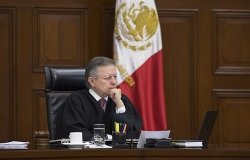Ahmadinejad's Confrontation with the Iranian Parliament
Bahman Baktiari, Director, The Middle East Center, University of Utah
Overview
Recent developments within Iran's political institutions suggest that Iranian President Mahmoud Ahmadinejad faces growing domestic opposition from an unlikely source: the ruling conservative movement. Professor Bahman Baktiari discussed how Ahmadinejad appears to be losing influence within Iran, particularly in the country's parliament. Given such domestic challenges, Baktiari asked, will Ahmadinejad's presidency survive the increasing conflict with the Iranian parliament?
On December 7, 2010 the Middle East Program hosted a discussion on "Ahmadinejad's Confrontation with the Iranian Parliament" with Bahman Baktiari, Director of the Middle East Center at University of Utah, to address the nature of the internal conflict that Ahmadinejad faces. Haleh Esfandiari, Director of the Middle East Program at the Woodrow Wilson Center, moderated the event.
Baktiari provided an overview of the emerging conservative movement and factional politics within Iran. He argued that while Ahmadinejad encounters antagonism from foreign governments over Iran's nuclear program and a domestic reform movement, these opponents may prove less threatening than conservative clerics and legislators. Two primary reasons for the conservatives' potency are their prevalence throughout Iran's domestic institutions and their religious legitimacy.
Attacks against Ahmadinejad's authority, have escalated in recent weeks as MPs, such as Ahmad Tavakoli, have used the terms censure and impeachment in parliamentary discussions and press releases about the president. Baktiari explained that under Speaker Ali Larijani, several anti-Ahmadinejad MPs have taken leadership positions within the parliament and some in the judiciary are revealing anti-Ahmadinejad tendencies. He also noted that the struggle between the president and Larijani, Ahmadinejad's rival and "silent enemy," has captured Tehran's attention as much as the nuclear issue has captured the world's attention. This "simmering conflict" and antagonism between the two branches of government has led to open attacks from each side, accusing each other of threatening the institutions of the Islamic Republic. Having failed to broker a compromise between Ahmadinejad and Larijani over the extent of parliamentary oversight on Ahmadinejad, the Supreme Leader Ali Khamenei's repeated intervention defending Ahmadinnejad has weakened both the parliamentary oversight, as well as the authority of the Supreme Leader himself since his intervention has not stopped parliamentarians from challenging Ahmadinejad in the press and the media.
More conservative clerics hint at frustrations with the president, and some in the Revolutionary Guards have directly attacked Ahmadinejad's executive power struggle with the parliament. These and other direct challenges to Ahmadinejad's authority may reflect, according to Baktiari, a pervasive and institutional movement against Ahmadinejad.
The emergence of a conservative, anti-Ahmadinejad movement in Iran's parliament, and other institutions in the Islamic Republic, indicates there is potential for a shift in the ideological direction of the country.
By Margaret Albert, Middle East Program
Haleh Esfandiari, Middle East Program
Speaker
Hosted By

Middle East Program
The Wilson Center’s Middle East Program serves as a crucial resource for the policymaking community and beyond, providing analyses and research that helps inform US foreign policymaking, stimulates public debate, and expands knowledge about issues in the wider Middle East and North Africa (MENA) region. Read more
Thank you for your interest in this event. Please send any feedback or questions to our Events staff.









